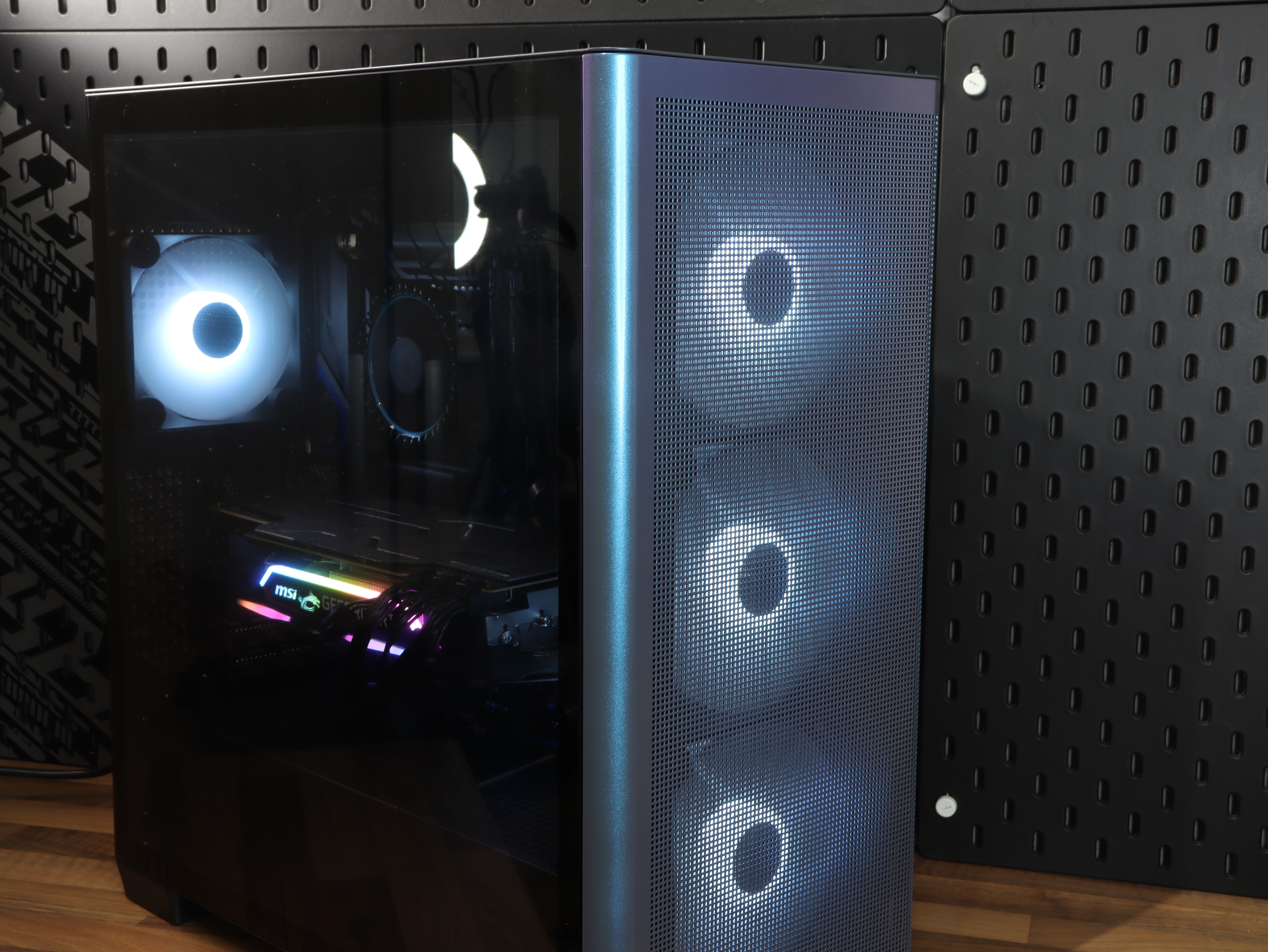APNX C1

Before we get started, I've been on APNX's website to find specifications on the C1.
Specifications and features
- Type: Mid tower
- Dimensions: 502 x 230 x 464 mm ( H x W x D )
- Materials: Metal, tempered glass
- Motherboard support: Up ATX
- Hard disk spaces: 3x 2.5" + 3x 3.5"
- Maximum PSU length: Up to 270mm
- CPU cooler maximum height: 166 mm
- Graphics card maximum length: 395 mm
- Colours: Black/White/chromaFlair
- PCI slots: 7
Fan support:
- Front: 3x 120mm / 3x 140mm
- Top: 3x 120mm / 2x 140mm
- Rear: 1x 120mm (1x 120mm)
- Bottom: -
- Side: 3x 120 mm
Radiator support:
- Front: -
- Top: Up to 360mm / 280mm
- Rear: Up to 120 mm
- Bottom : -
- Side : Up to 360 mm
Around APNX C1
The C1 from APNX is a mid-tower cabinet, which is available in the colors black, white and ChromaFlair. As it is the last one I got for testing. As previously mentioned, the C1 focuses on bringing performance and style together in one cabinet. Which can also be clearly seen, where we have very clean lines around the cabinet, and we have mesh in several places on the cabinet. We will return to this. It is possible to mount up to ATX motherboards, and it can have two 360mm radiators mounted at the top and side. For graphics cards, we have room for 395mm, which still gives plenty of room for an RTX 4090, and with room to spare.
The front is a mesh front, unlike many other cabinets, so the front goes around the side and covers almost half of the side, as well as the entire front. It provides a cabinet that has some rounded edges and provides a very stylish design.
Behind the front, a dust filter is mounted. The dust filter can be easily removed to allow the installation of other fans. It is not possible to mount a radiator in the front.
At the top of the cabinet, we have inputs for USB, USB-C and jack. In addition to that, we have a button for power, as well as control of the RGB.
Let's take the glass off. Can we look inside the cabinet? Here we have space for ATX motherboards, and as previously mentioned, plenty of space for all kinds of hardware, whether it's a 360mm radiator or a larger graphics card. There are not many "holes" for cables at the bottom, which means that the planning must be in place, there will be some thin cables that need to be at the bottom of the motherboard.
Four FP1 120mm ARGB PWM fans are included, as APNX's own fans. With 30mm thickness. Where it is possible to mount up to eleven fans, with the possibility of also mounting a fan behind the motherboard.
On the back we have seven PCIe expansion slots, which gives plenty of space to mount either more graphics cards or other things that need a PCIe input.
Let's take a look at the back, at C1. Is it built up in 2 parts. On one side, there is also a plate that helps to cover cables, and SSD hard drives can be mounted on it.
Installation of hardware
Before we move on to mounting the hardware in the case, let's take a look at the included accessories. We have everything from screws, pads for hard drives, strips, Velcro straps and a manual.
The power supply is inserted from the back. By also mounting the PSU holder for the power supply first.
The motherboard that has been fitted is an ATX, together with the RTX 2080 Ti. We still have plenty of room for the front. I found after installing the motherboard that I had no way to pull the HD Audio cable to the bottom of the motherboard without it having to be pulled from the side.
This could have been avoided if I had pulled that cable before installing the power supply.
Price
I have found a price for C1 From APNX which is190$, for ChromaFlair. If you can settle for black or white, it is only possible to get away with 130$.

If you want to see more details about C1, you can find more on ANPX's website by clicking on the banner.
Conclusion
Just because you're a "new" boy doesn't mean you have to figure things out first. APNX has got off to a good start with their C1, and there are perhaps small things that could be optimized to create a better combination in the product. Among other things, with the cable routing to the CPU, which has nothing to attach the cable to. This will of course be hidden with a plate.
The cabinet itself offers good space, whether it is custom water cooling or AIO, the cabinet offers good options, where it can have up to 360mm in either the top or the side.
The material itself feels of incredibly good quality, and all sides can be removed without using tools. It is only when the things inside have to be separated that a screwdriver is needed.
Although the cabinet has an affordable price, this does not mean that there has been a compromise with the quality or the things that come with the cabinet. Among other things, the cabinet has a built-in graphics card holder, which can be adjusted in relation to the size of the graphics card.
I conclude the test by giving the C1 from APNX a score of 9 out of 10, along with the great product award. APNX is off to a good start, and it is clearly a cabinet where many small details have been thought of, which have become more relevant, such as the size of the hardware and the heat that is generated, becoming more and more widespread.
Pros
- Good space
- Stylish design
- Good airflow
- Possibility of water cooling
- USB-C on the front panel
- Good quality
- Price
- GPU holder
Cons
- Needs a little extra for cable routing for CPU cables
Score: 9

Latest computer case
-
15 Jancomputer case
-
06 Jancomputer case
be quiet! Light Base 900FX
-
13 Deccomputer case
Be quiet! Pure base 501 Airflow
-
26 Novcomputer case
XPG is ready with a new case and magnetic fan
-
18 Sepcomputer case
Fractal Design Era 2
-
21 Juncomputer case
Fractal Design Mood
-
07 Juncomputer case
BeQuiet ready with new cabinets at Computex
-
06 Juncomputer case
New cases from Fractal Design at Computex
Most read computer case
Latest computer case
-
15 Jancomputer case
Be quiet! Light Base 600 LX
-
06 Jancomputer case
be quiet! Light Base 900FX
-
13 Deccomputer case
Be quiet! Pure base 501 Airflow
-
26 Novcomputer case
XPG is ready with a new case and magnetic fan
-
18 Sepcomputer case
Fractal Design Era 2
-
21 Juncomputer case
Fractal Design Mood
-
07 Juncomputer case
BeQuiet ready with new cabinets at Computex
-
06 Juncomputer case
New cases from Fractal Design at Computex






